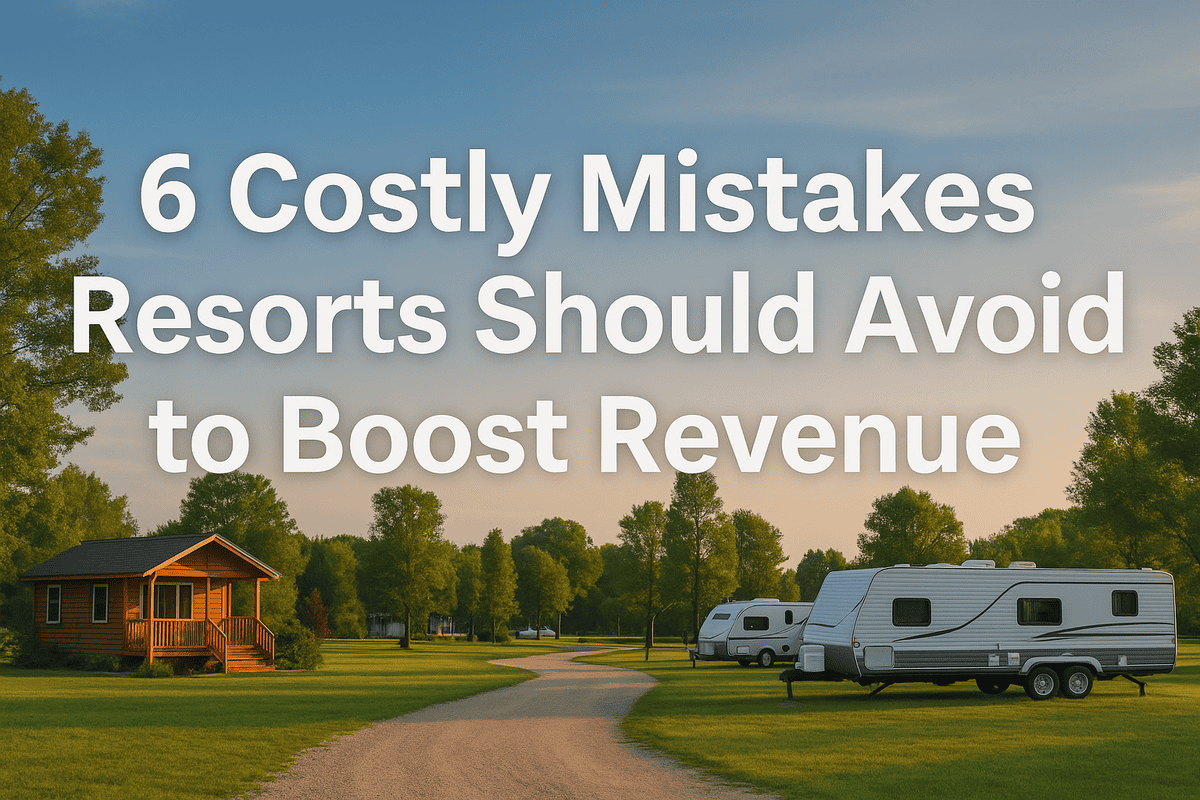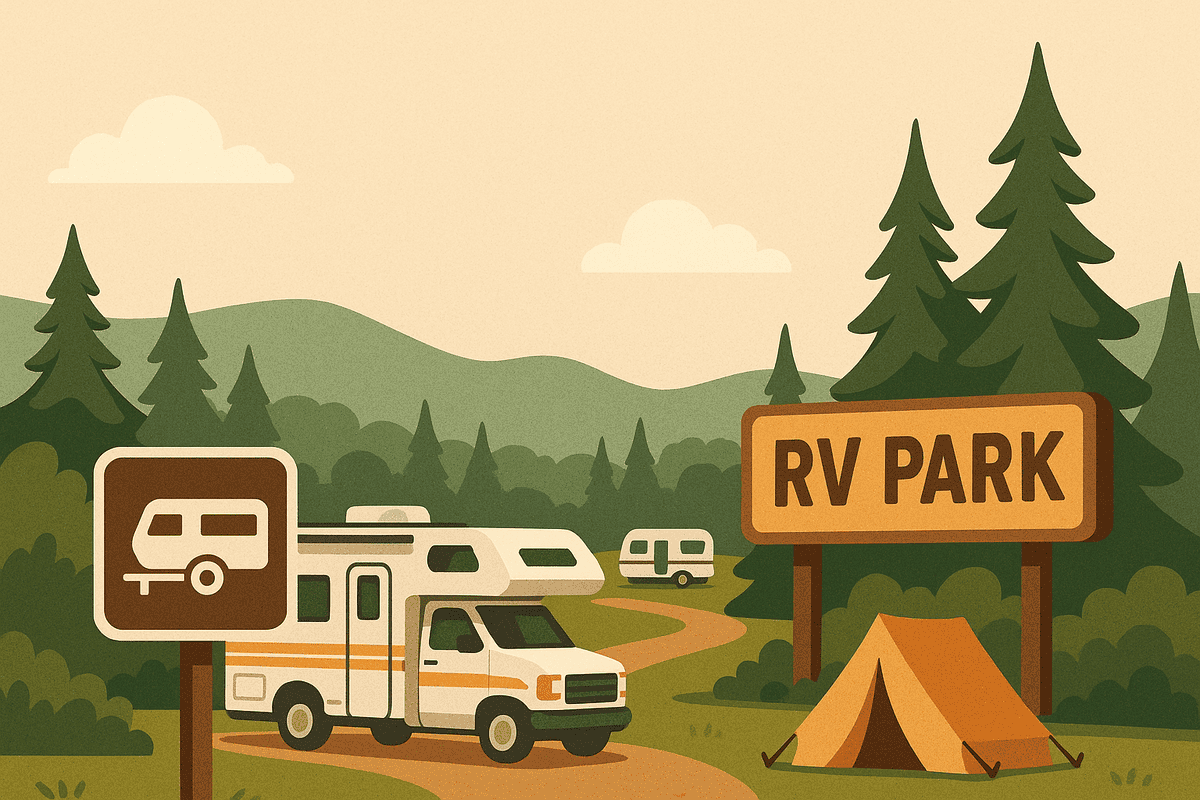6 Costly Mistakes Resorts Should Avoid to Boost Revenue
Resort and campground owners often believe they are doing well – their balance sheets are positive and most systems are running ok. Yet, there is that knowledge they could be doing even better. They try everything they can think of to increase their booking rate but to no avail. If only owners could figure out where they are going wrong, they could enact a plan to see a dramatic increase in bookings – ultimately boosting their bottom line. Many give up – labeling it impossible to decipher the code to more reservations. However, there are six simple mistakes that resort owners make that cost them thousands of dollars. Here are those six mistakes and the easy-to-implement steps that will fix them.
1. Underestimating the Power of Online Reviews
Guest reviews are critical – now more than ever. A quick internet search can lead a potential guest to make a quick decision on the value and potential enjoyment of the resort they are considering. Positive reviews can land bookings more effectively than many forms of advertising. In the same way, negative reviews can significantly harm a campground’s or resort’s reputation. Vacation destinations that don’t encourage positive reviews or respond to negative ones miss out on the opportunity to build trust with potential guests.
To begin building their online reputation, resort owners should have the staff actively ask satisfied guests to leave reviews. Not all will, but with encouragement, they are more likely to do so – and the more satisfied the guest, the more likely they are to write a review.
Resort owners should make a habit of responding to both positive and negative feedback in a professional and timely manner. Negative feedback left unanswered for too long or appearing to remain unresolved can make the resort seem guilty of any criticism voiced and deaf to their travelers’ concerns.
Incorporating customer feedback will improve the overall guest experience. When a review points out an issue that needs tweaking or overhauling, it should be addressed and reviewed to determine whether changes are needed to improve guest satisfaction. How much better it is to see that a resort addresses inadequacies or problems, instead of ignoring them. Also, a mostly satisfied guest may return for another stay – seeing that their concerns were important and fixed, will reflect in their next review.
2. Not Having an Effective Mobile Strategy
Each day, more guests are using mobile devices to book their vacations. Resorts that haven’t optimized their websites or booking systems for mobile devices are losing out on a large segment of potential guests. A slow, clunky booking process and deficient mobile site will dissuade potential customers from scheduling. Addressing their mobile site to ensure it is an easy to understand and fast-moving process can quickly lead to increased bookings for vacation properties. Platforms like ResortForward specialize in creating fast, user-friendly mobile booking experiences designed specifically for RV resorts and campgrounds.
As the population becomes more tech-savvy, guests look to do everything on the go. Having to sit behind a laptop or home computer browsing may be optimal for some, but more and more are looking to their phones first. ResortForward makes the reservation process seamless and fast on all devices. When the reservation process is simple – no matter where travelers are booking their stays, the rate of people going elsewhere that is easier to book drops, increasing guest acquisition and retention.
3. Failing to Diversify Marketing Channels
Many resorts focus exclusively on traditional marketing (brochures, print ads, etc.) or rely too heavily on one channel, like OTAs (Online Travel Agents). The digital landscape is diverse, and RV resort and campground owners that fail to diversify their marketing channels miss opportunities for higher visibility and bookings.
Resorts benefit most when utilizing a mix of marketing channels – including traditional print media, as well as digital channels such as social media, email marketing, influencer partnerships, SEO, paid ads, and content marketing strategies like blogs, videos, and educational resources. There may be no such thing as too much advertising, but advertising in the wrong spaces can be a waste of time and money.
By investing in content that speaks directly to their target audience, vacation properties capitalize on increased engagement, stronger brand loyalty, and more consistent bookings. People receive information in a variety of ways. While one may be drawn to photographs and videos, another may not be comfortable choosing a destination unless they can read about it thoroughly. Much like advertising needs to be directed and targeted, the various ways potential guests digest information must be taken into consideration as well.
Finally, results from each channel must be tracked to optimize strategies. Keeping a keen eye on where advertising is working best, as well as where it appears to be a waste, will give resort owners invaluable insight into their marketing efforts. High success rates in a particular marketing channel or message indicate where more resources should be focused.
4. Ignoring the Importance of Pricing Strategy
Pricing is a delicate balance. Resorts and campgrounds that are either too aggressive with their pricing or fail to adjust their rates based on demand, seasonality, and market competition risk losing out on both revenue and guests. Underpricing can attract budget-focused guests who don’t spend elsewhere in the resort, while overpricing may drive potential guests away.
A dynamic pricing strategy that adjusts according to demand, season, and competitor rates can help maximize revenue and occupancy. A business must not only look inwardly, but also outwardly at competitors, time of year in their locale, and high profile events that draw large crowds to their specific town. For instance, a major event like the Super Bowl will always bring people in droves to the host city. However, a rodeo competition might be great for resorts in the west, but not a large draw in the northeast.
Pricing tools can help properties stay competitive and maximize revenue per room. ResortForward offers dynamic pricing tools that automatically adjust rates based on demand and seasonality, with options to customize for local events, helping to optimize revenue. A site near the pool or with a scenic view will always be more desirable than one next to the dumpsters or facing the road. Campgrounds and RV resorts should take full advantage of site-specific features. If some sites offer mountain views while others back up to a busy highway, the pricing should reflect that. Similarly, consider each site’s proximity to amenities like restrooms, laundry, and recreational areas, and implement a tiered pricing structure that maximizes revenue and guest satisfaction.
Pricing should be regularly reviewed and updated based on current market conditions. A downturn in the economy may force all resorts to lower their room rates. Staying ahead of the curve by being the first to lower prices in such a scenario can attract more guests, while competing resorts may remain unbooked.
5. Not Providing a Unique Experience
Guests are looking for more than just a place to sleep—they want an experience. Resorts and properties that fail to offer unique, memorable experiences or neglect cater to the specific desires of their target market may miss out on attracting high-paying guests and repeat customers.
Resort destinations should focus on creating memorable guest experiences, such as offering locally inspired activities, specialized dining experiences, wellness services, or themed events. Every resort location across the country has its own unique attractions to showcase. Properties should focus on the events or themes that draw guests to the area and capitalize on them. People often choose to visit a resort in a specific location to immerse themselves in that local culture. Successful properties anticipate and deliver on what their guests are seeking.
Not every guest is the same. Properties should invest in customizing the guest experience for different types of travelers—families, couples, adventure seekers, and more. Families with children won’t engage in the same outings as adventure seekers looking for a challenge. Understanding guests and their specific needs allows properties to create more tailored and satisfying experiences.
Property owners should ensure they stand out in a crowded market by offering features or experiences that others don’t. In areas where many resorts seem similar, guests often ask themselves why they should choose one over another. Providing a clear and compelling reason to book at a particular resort can give it the advantage needed and will be reflected in positive reviews.
6. Neglecting the Importance of Staff Training and Service
No matter how luxurious a resort is or how beautiful the location, poor customer service will drive travelers away faster than anything else. Owners that neglect staff training and fail to focus on guest satisfaction may suffer from negative reviews, lower occupancy, and decreased repeat visits.
In the past, Disney has been associated with top-tier customer service. Few other resorts matched in terms of targeting their demographic and making superior investments in their staff (or cast members, as they are called). Resort owners should strive to embody that same level of dedication and personalized service for their own audiences.
Investing in regular staff training ensures that everyone—from housekeeping to front desk personnel—is well-versed in exceptional customer service. This can range from simply directing a guest to a specific area of the resort to resolving any issues the guest may have with the resort or their experience. Every staff member should prioritize the guest and their needs.
Fostering a customer-first culture motivates staff members to go above and beyond to meet guest needs. This might include rewarding staff who exceed expectations each month or providing tokens of appreciation that staff can wear. Whatever the method, it is important that staff feel essential to the guest experience. Additionally, technology platforms like ResortForward help streamline operational tasks, allowing staff to focus more on delivering exceptional guest service.
Clear protocols should be created for handling complaints or issues, ensuring swift and effective resolutions. Nothing drives guests away faster than feeling unheard. When a need or complaint arises, it should be addressed promptly. Guests who feel heard are more likely to return.
By addressing these six common mistakes, RV resort and campground owners can increase their revenue, improve guest satisfaction, and stand out in a competitive industry. Avoiding costly errors and focusing on proven strategies leads to greater profitability.
To see how ResortForward can support RV resort, mobile home park and campground owners in increasing revenue and improving guest satisfaction, contact us here.




